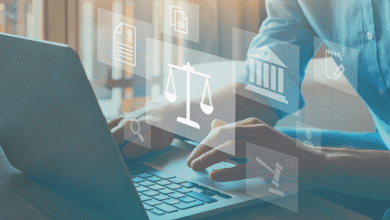How to Understand Technology and Law In 2023

In today’s fast-paced digital world, the intersection of technology and law has become increasingly important. As advancements in technology continue to shape our lives, it is crucial to have a clear understanding of how these developments interact with the legal landscape.
Introduction
In this digital age, technology permeates every aspect of our lives, from communication and commerce to healthcare and entertainment. As technology evolves, so does the need for laws and regulations to govern its use. Understanding the intersection of technology and law is essential for individuals, businesses, and legal professionals alike.
The Evolving Role of Technology in Society
Technology has become deeply integrated into society, revolutionizing how we live, work, and interact with one another. From smartphones and social media to artificial intelligence and blockchain, technological innovations continue to shape our daily lives. It is crucial to stay informed about these advancements to navigate the legal implications they may bring.
Legal Implications of Technological Advancements
Privacy and Data Protection
The digital age has raised concerns about privacy and the protection of personal data. With the increasing amount of information shared online, individuals and organizations must understand the legal frameworks surrounding data privacy, such as the General Data Protection Regulation (GDPR) and other relevant laws. Compliance with these regulations is vital to safeguard sensitive information and maintain the trust of users and customers.
Cybersecurity and Digital Threats
As technology advances, so do the threats it poses. Cybersecurity breaches, data hacks, and identity theft have become commonplace. Understanding the legal aspects of cybersecurity is crucial for individuals and businesses to protect themselves against these risks. Compliance with cybersecurity regulations and implementing robust security measures are vital components of any comprehensive legal strategy.
Intellectual Property Rights
Technological advancements often involve the creation of new intellectual property, including patents, trademarks, and copyrights. Understanding intellectual property laws and their application to technology is essential for protecting inventions, brands, and creative works. This knowledge enables individuals and businesses to safeguard their innovations and prevent unauthorized use or infringement.
Read More: Top 10 Cyber Security Laws in NYC
AI and Automation
Artificial intelligence (AI) and automation technologies are transforming various industries, including healthcare, finance, and transportation. As these technologies become more prevalent, legal professionals must understand the legal and ethical implications they entail. Issues such as liability, accountability, and transparency arise in the context of AI and automation, requiring careful consideration and proactive legal measures.
Regulatory Frameworks and Compliance
In response to the rapid pace of technological advancements, regulatory frameworks have been established to govern various aspects of technology use. Compliance with these regulations is essential to avoid legal repercussions. Staying up to date with the ever-changing regulatory landscape ensures that individuals and businesses can navigate technology-related legal challenges effectively.
The Importance of Technological Literacy for Legal Professionals
Legal professionals, including lawyers and judges, must possess a strong understanding of technology and its impact on society. Technological literacy enables them to effectively advocate for their clients, interpret complex technical evidence, and make informed decisions in cases involving technology. Investing in technological education and staying updated on emerging trends is crucial for legal professionals in today’s digital world.
Collaborative Efforts between Tech and Legal Experts
To bridge the gap between technology and law, collaboration between tech and legal experts is crucial. By working together, these professionals can develop innovative solutions, shape policy frameworks, and anticipate legal challenges associated with emerging technologies. Collaborative efforts foster a deeper understanding of the intricacies of technology and law, leading to more effective and comprehensive solutions.
Ethical Considerations in Technology and Law
As technology continues to advance, ethical considerations become increasingly important. Balancing innovation with ethical principles ensures that technology is developed and used responsibly. Legal professionals play a vital role in advocating for ethical practices and shaping policies that align with societal values. Understanding the ethical implications of technology helps safeguard individual rights and societal well-being.
The Future of Technology and Law
The relationship between technology and law will continue to evolve as new advancements emerge. Future considerations include the regulation of emerging technologies like virtual reality, blockchain, and quantum computing. Legal professionals will need to adapt and expand their knowledge to address these novel challenges effectively. Embracing technological advancements while upholding legal principles will shape the future of technology and law.
Conclusion
In conclusion, understanding the intricate relationship between technology and law is paramount in 2023. As technology continues to revolutionize various aspects of society, individuals, businesses, and legal professionals must stay informed about the legal implications and regulatory frameworks surrounding technology use. Collaborative efforts between tech and legal experts, along with a strong emphasis on ethical considerations, will pave the way for a harmonious integration of technology and law in the future.
FAQs
Q1: How can individuals protect their privacy in the digital age?
A1: Individuals can protect their privacy by being mindful of the information they share online, using strong and unique passwords, and regularly reviewing their privacy settings on various platforms.
Q2: Why is cybersecurity important in the context of technology and law?
A2: Cybersecurity is essential to protect sensitive information, prevent data breaches, and maintain trust in digital systems. It ensures that individuals and organizations can operate securely in the digital landscape.
Q3: How can businesses ensure compliance with data protection regulations?
A3: Businesses can ensure compliance with data protection regulations by implementing robust security measures, conducting regular audits, and training employees on privacy best practices.
Q4: What role does technology play in the legal profession?
A4: Technology plays a significant role in the legal profession, enabling more efficient legal research, document management, and communication. It also presents new challenges related to e-discovery and digital evidence.
Q5: What are some emerging technologies that will impact the future of law?
A5: Emerging technologies such as artificial intelligence, blockchain, and virtual reality have the potential to significantly impact the future of law by automating tasks, enhancing efficiency, and transforming legal processes.











